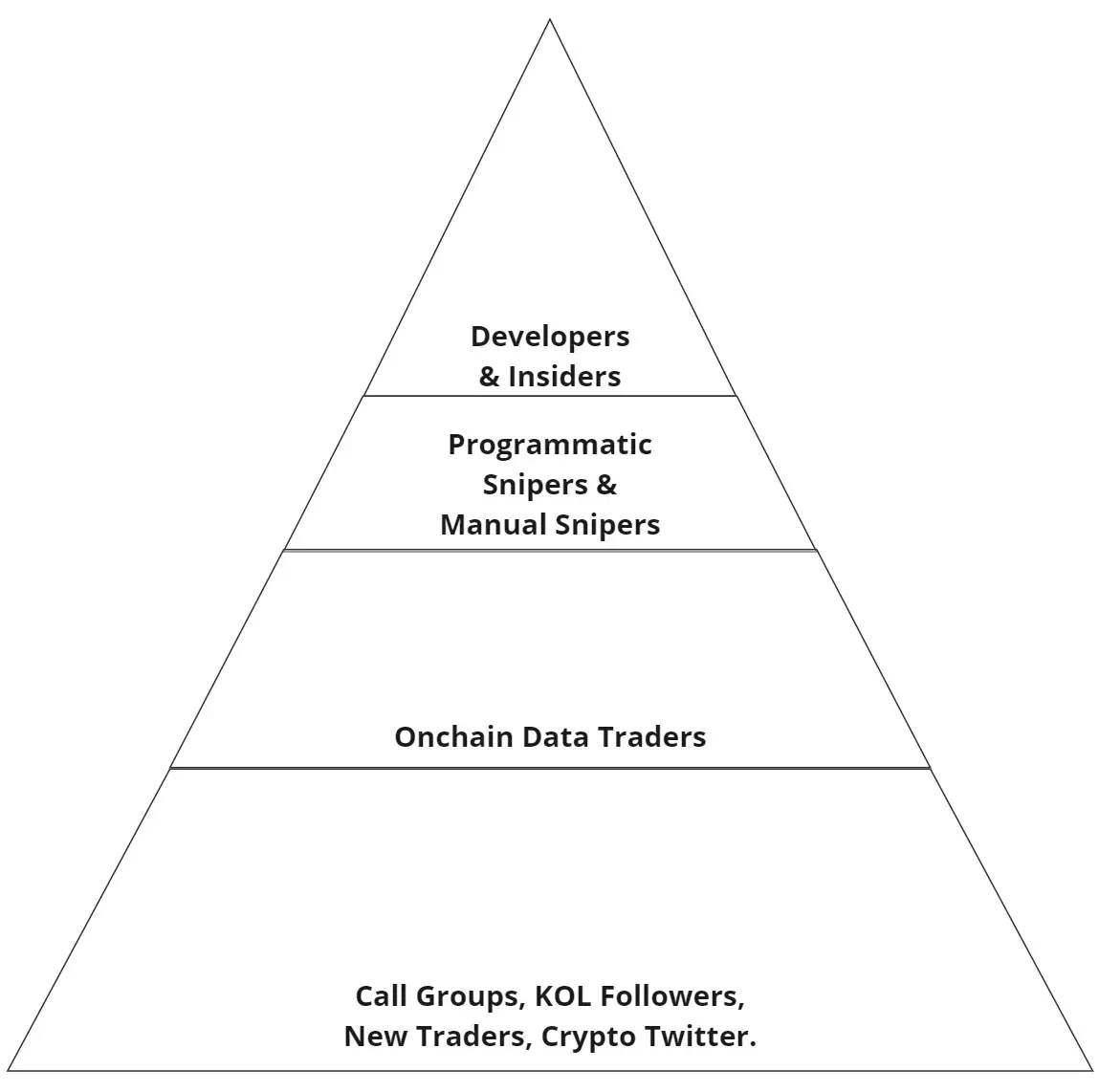لعبة السيولة على السلسلة: مطاردة المطورين والقناصة والتجار
المؤلف الأصلي: post-goa
الترجمة الأصلية: TechFlow
Based on my research, here is a brief summary of the roles that play the on-chain liquidity game.

Developers and Insiders
False utility slowly pulls up or is “exploited”:
-
These were very popular in the early AI craze because no one really understood AI at the time, but everyone wanted early exposure.
-
They never complete more than 1% of their roadmap, usually hyped up by opinion leaders (KOLs).
-
The team often allocates a large amount of supply to themselves when the contract is launched, and then distributes it before anyone else. These tokens are then hidden in multiple wallets and then sold.
-
Slowly pull up after the initial rally or hit a hole after a few weeks of pumping, and quickly run away after accumulating a large market cap (20-100 million).
-
Involving groups that repeatedly release fake projects that follow the current popular narrative. These projects are often spin-offs of more successful large venture-backed projects.
Programmatic Sniper
Custom Robots:
-
A custom bot that systematically targets multiple ETH projects.
-
The bot follows specific parameters based on the smart contract and transaction volume.
-
The goal is to achieve 10-100x returns on a handful of projects from many that fail or run away, almost like a form of income.
Manual Sniper (ETH)
One of the most profitable on-chain traders:
-
Search and discover new contract addresses, or obtain contract addresses through internal messages.
-
Simulate contracts to check their security and other indicators of potential, or to understand the background of the team.
-
Outbid other snipers when promising contracts launch.
-
Grab large amounts of supply when promising on-chain or stealth projects launch without anti-sniping defenses or using pre-launch platforms like Fjord.
-
Use multiple wallets to snipe to hold a large amount of supply, more than 1%.
-
In many cases, projects are subject to snipers who can smash the project to zero at an early stage.
-
Many snipers enter the project and play against each other, hoping that dumb money will come in and sell when the market cap reaches 500k-1m, and then the project dies. This happens every day on the ETH mainnet.
-
Combining some fundamental analysis and machine learning, snipers who identify which contracts are likely to bring in profits of over $5 million in market cap or more have significantly outperformed others over the past year.
-
Most snipers hold their coins for less than a few hours.
On-chain data traders
Tracking the actions of snipers and insiders:
-
Track the movements of profitable (highest PNL) wallets.
-
Track volume and holder alerts.
-
Often buy strong projects after snipers sell off; or, even if they know snipers are holding a large supply, they will buy if the launch is very promising.
-
Some basic or narrative analysis is usually performed on newly launched projects.
-
Long term holder.
-
As on-chain transactions become a growing segment of the space and more on-chain services become available for retail use, their popularity has diluted and increased.
-
It is the exit liquidity for the above participants.
-
These traders often bet against each other on newly launched projects that will eventually go to zero. Its just a matter of who gets in first.
-
Relying on dumb crypto-twitter (CT), opinion leaders (KOLs) or other later on-chain traders as exit liquidity.
Other traders
Haven’t learned how to use Etherscan or check basic metrics for a token:
-
Get information from call groups, opinion leaders (KOLs), and Crypto Twitter (CT).
-
Slower traders, tend to buy the hype.
-
Believe that cryptocurrencies have utility beyond speculation.
-
One step behind in narrative.
-
Probably only been in the field for less than a year.
-
These traders have most likely given up on buying new utility projects or meme coins. Or they are slowly starting to learn about on-chain transactions and gradually upgrading to the above categories.
لخص
On-chain trading is a liquidity game for developers, snipers, on-chain data traders, and others. As liquidity entering the on-chain space decreases, competition between participants becomes more intense, with the result that those at the top of the pyramid reap most of the rewards.
This article is sourced from the internet: On-chain liquidity game: the hunt of developers, snipers and traders
ذات صلة: لماذا لا يستطيع هذا السوق الصاعد تكرار الموسم البديل لعام 2021؟
المؤلف الأصلي: Distilled الترجمة الأصلية: مقدمة TechFlow على مدار العامين الماضيين، تابعت سوق العملات البديلة من كل قلبي. ومع ذلك، كان هناك دائمًا سؤال في السوق: الموسم البديل الذي طال انتظاره والمشابه لعام 2021 لم يظهر بعد. سأشرح هنا السبب وأقدم اقتراحات لتحسين استراتيجية العملات البديلة الخاصة بك. دعونا أولا نحدد "الموسم البديل". التعريف: عندما تتفوق العملات البديلة على البيتكوين ($BTC) وترتفع الأسعار في جميع المجالات. هذه فترة ازدهار كبير في العملات البديلة وتتزايد النشوة في السوق. فكر في الأمر مثل المد المرتفع الذي يرفع جميع القوارب. هذا ما يمكن أن يفعله موسم العملات البديلة القوي، مما يعزز كل قطاع تقريبًا. ما هي القوة الدافعة؟ الكمية الهائلة من السيولة التي تتدفق إلى السوق. تتبع تدفقات السيولة تاريخياً، كانت هناك…







